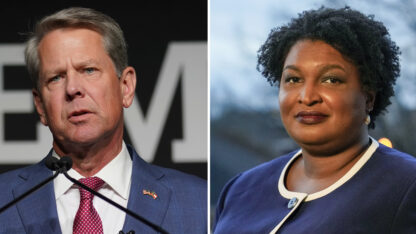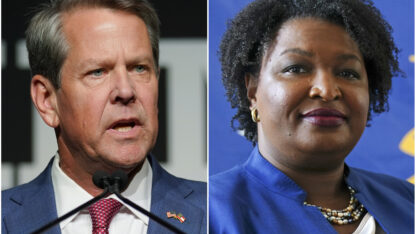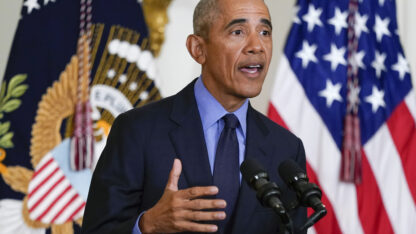Kemp, Abrams face off in first debate of 2022 gubernatorial race

Four years after Brian Kemp and Stacey Abrams first shared a debate stage, the two candidates met for a rematch Monday night as they again compete to lead Georgia.
As longtime political rivals, Kemp and Abrams did not hesitate to spar back and forth. But they both also intimately know the mechanics of state government, and so the debate was more substantive than personal, and at times, even wonky, as the two hashed out disagreements about the state budget and Medicaid expansion.
Monday’s matchup did make some news. Asked about recordings where Kemp can be heard talking about bans on emergency contraceptives and destroying embryos, Kemp said he would not push for any additional restrictions on abortion.
“No I would not,” Kemp said. “That’s not my desire to do that. Georgians should know that my desire is to help them continue to fight through 40-year high inflation.”
Libertarian Shane Hazel also joined the top two candidates on stage, often butting in and trying to steer the conversation his way, but Abrams and Kemp kept their focus trained on each other.
“The most dangerous thing facing Georgia is four more years of Governor Kemp,” Abrams said.
“My record’s being attacked because Ms. Abrams doesn’t want to talk about her own record,” Kemp said. “I would remind you that Stacey Abrams campaigned to be Joe Biden’s running mate.”
Much has changed since Kemp narrowly beat Abrams by about 55,000 votes in 2018.
More than 1.5 million new voters have registered in Georgia since then. Kemp is now an incumbent, tested by four years in office that included a global pandemic and the economic disruptions that went along with it. His approval rating is higher than Democrat Joe Biden’s in Georgia and, for better or worse, has a long legislative record that includes a slew of conservative priorities like enacting permitless carry and a restrictive abortion law.
Abrams, meanwhile, has become a global celebrity and gained a prominent platform to speak about issues like voting rights and health care access, buoyed in part by her role in helping turn Georgia blue in 2020 for the first time in years.
But unlike 2018, when a blue wave swept the country driven by voters repelled by Donald Trump, the former president is not on the ballot or in the White House and the current occupant, Joe Biden, is notching underwater approval ratings. And the country is different, too. Following a ruling by the U.S. Supreme Court, states like Georgia have drastically curbed access to abortion. Persistent inflation is driving up costs of groceries and gas and underlying many voters’ fears about the economy.
Throughout the debate, Kemp emphasized his track record, especially his management of the economy through the pandemic.
“I was the first state to open the small parts that we asked to close and our recovery has been as good as any state in the country,” he said.
Kemp also touted Georgia’s budget surplus, which provided pay raises for teachers and a hefty income tax refund. But Abrams has criticized how the governor has chosen to distribute that surplus, saying the tax measures disproportionately benefit wealthier Georgians and have been made possible by federal relief packages he opposed.
The two also debated crime and gun violence, engaging in a testy exchange about the permitless carry gun law Kemp signed this year. Throughout the campaign, Abrams has hammered Kemp for what Democrats call “criminal carry,” and Kemp has painted Abrams as not sufficiently supportive of law enforcement.
“Unlike you, I don’t have the luxury of relying on slogans to describe my position on public safety,” Abrams said, talking about her two brothers — one of whom has been convicted of crimes and the other who has been pulled over without cause by police. “And like most Georgians, I lead a complicated life, where we need access to help, but we also need to know we are safe from racial violence.”
With a few weeks still to go before Election Day, most polls show Abrams trailing Kemp, while Democratic U.S. Sen. Raphael Warnock appears to be locked in a tighter race with his Republican challenger, football star Herschel Walker.
Asked why she is behind Kemp in the polls, despite public opinion more closely aligning with her positions on topics like guns and abortion, Abrams said the surveys don’t fully capture irregular and marginalized voters who will turn out for her.
“Polls are a snapshot,” she said. “The question is, who are they taking a picture of?”








